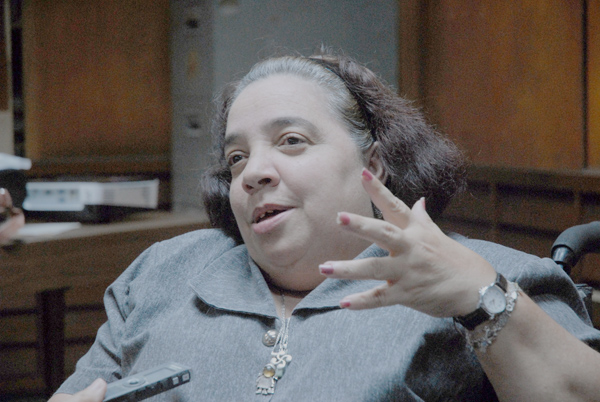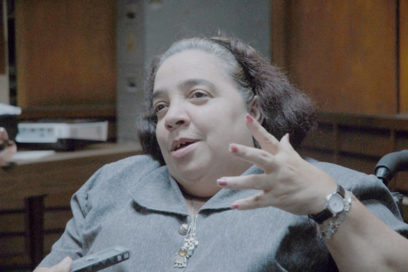
November is really important for Isabel Moya. She was born on November 25, 1961, the day we celebrate the struggle against women’s violence, and the Cuban magazine Mujeres was founded on November 15, 1961. She started working there the same month but in 1984.
“I have worked in the magazine for 30 years. I never believed I would be here for so long. I thought that when I finished my training period as journalist, I would devote my career to do the journalism I wanted to, so I imagined that I would work in another place.
“However, as far as I was discovering the Cuban women, what they have done, in my tours to the country, interviewing them, when I had the opportunity to see all that the Cuban Women Federation (FMC) had been doing, the meetings with Vilma Espin- former president of the FMC-, with the farmer women and workers from different sectors; then I started to fall in love with the topic.”
She is an expert in gender theory. She has published four books and has a vast experience as journalist. She is well known as Isabelita, and she is today the director editor of Mujer.
Do you believe it is possible to talk about gender topics without preparation?
First of all, gender is not a synonym of woman; it is about all the relations between women and men, the internal relations also between men, between women and society.
Of course, we deepen on the topic of women, because they have been under the condition of subordination and so, there is the need to change their situation and condition.
It is the same case that you cannot write on economy without being prepared, you cannot talk about issues on violence, birth-rate or other linked with gender, if you do not study hard on what is the male and female matter.
Some people have questioned the need of the FMC. What do you think about it?
The FMC is more important today than ever, for its complexity in really having a culture of equality. During the decades of the 1960s and the 1970s, it fought for the assignment of women in a job. In the decades of the 1980s and 1990s, the Federation not only fought for its assignment in a job, but also to employ tem in important posts where important decisions should be taken, but there are still signs of discrimination. So the organization has the role to adequate its work to new tasks in the current times and the need of women at present.
What do you think are the challenges of the women’s organization?
Some years ago I asked some scientific women: which is the main obstacle in your performance? Many of them talked about their double and triple activities. When you see this, then you realize there are still complex challenges for Cuba today. It is not a matter of participation; it is not in the laws, “although we should continue working on them. There is even the proposal to change the Family Code.” The greater challenge today is in culture, subjectivity, in habits, judgments of value. And that is really more difficult than passing a law, because you are facing 500 years of mixed culture, which is still chauvinist and patriarchal.
We have generally achieved the fulfillment of the Development Goals of the Millennium, especially objective 3, referred to the topic of gender. If we compare our country with Latin America, we have advances a lot, but we should compare ourselves with our dreams, which is a culture of equality. That is why I said the challenge is more complex.
The current challenges, either for the Federation or the society together, are how to work with individuality, there is the great challenge. What are the methods to use with the young men and women?
In the interview you asserted we should create a feminist counter culture in the media, which does not mean to confront women against men or deny plurality, but, the contrary.” Can you deepen in that aspect?
You should understand you are not only woman or men. There is a black woman or a black urban or rural man, all those conditions either for men or women are built or lived. They should all be treated.
It is important to deal with diversity, not only understanding it like the diverse sexual orientation, but assuming it according to the skin color, where people develop, with their possibilities.
At present, there is a new modality in relation to employment: with the non state properties, how women are going to be included, and what has been done so that they do not lose all the rights conquered.
For instance, there is not much said about those self employee women who have the right of maternity leave that is a great achievement. Self employee women in other countries do not have these rights; however, in Cuba is different.
Self employee women will attend the women’s congress as delegates, so we can work together.
The Cuban Revolution has characterized as deeply humane. To build the socialism we want, this is the central topic, because the human being and dignity are the best things conquered by the Revolution.
What other topics will the 9th Congress of the FMC deal with?
Those related to the values, social prevention, women’s promotion, and others. We are sometimes worried about social indiscipline, the appearance of some problems we considered were eliminated in one way or another. So we must focus our job on prevention. These are topics we will deal with in the Congress, because they are important for our society.”
How has Mujeres’ magazine accompanied the FMC in its goals and job?
Mujeres’ magazine was born in 1961 because it was always very clear for Vilma Espin the role of the media as a space to dialogue with women. For the first time, topics about sex were published and by then, it was a scandal. Later, other topics have been published like changing the traditional paternity up to the current theory of gender and that of the violence against women.
This editorial is one of the tools the Cuban Women Federation has to face that challenge I have talked about.
Living is experiencing, but you also learn how to live. Mujeres’ magazine wants to help, teach people how to live, that is our main purpose.
Acerca del autor
Graduada en Licenciatura en Periodismo en la Facultad de Filología, en la Universidad de La Habana en 1984. Edita la separata EconoMía y aborda además temas relacionados con la sociedad. Ha realizado Diplomados y Postgrados en el Instituto Internacional de Periodismo José Martí. En su blog Nieves.cu trata con regularidad asuntos vinculados a la familia y el medio ambiente.


